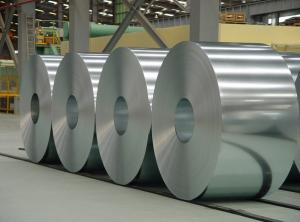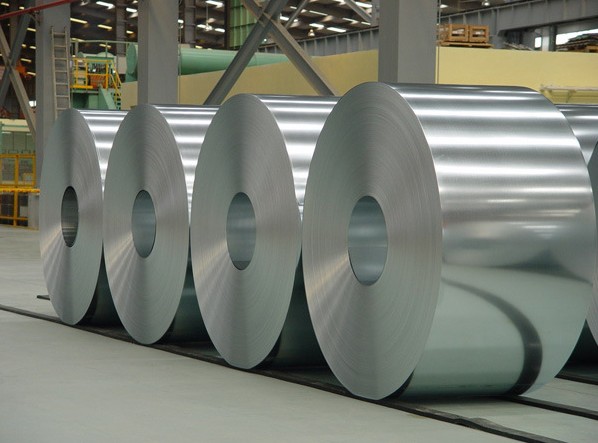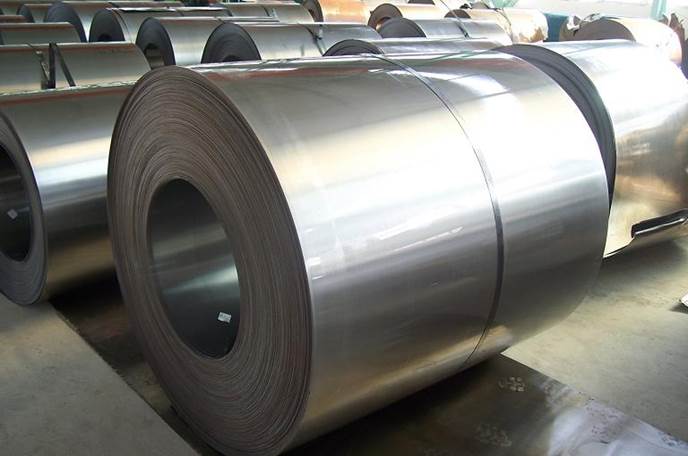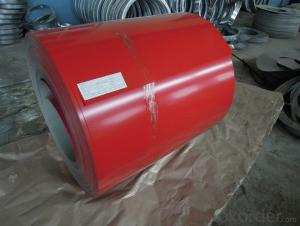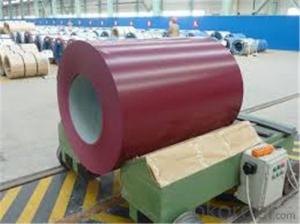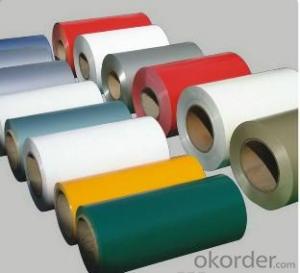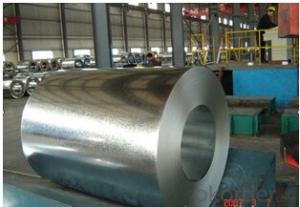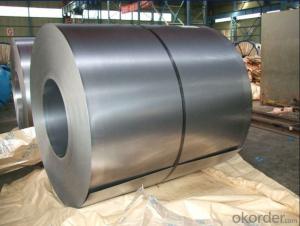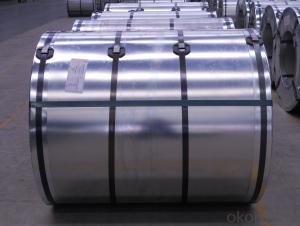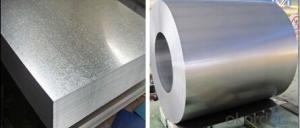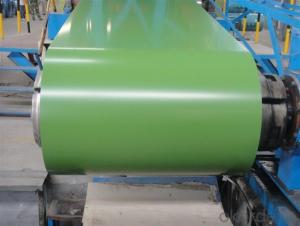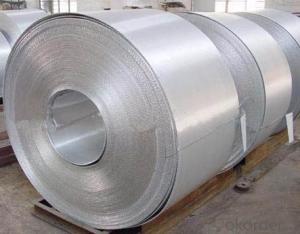High Quanlity Cold rolled steel coils
- Loading Port:
- China Main Port
- Payment Terms:
- TT OR LC
- Min Order Qty:
- -
- Supply Capability:
- -
OKorder Service Pledge
OKorder Financial Service
You Might Also Like
Specification
Product Name | Cold Rolled Sheet Coil |
Material | SPCC/SPCD/SPCE/DC01/ST12/ ST14/SPCD/DC03/DC04 ect. |
Grade Standard | JIS G3302, EN10142, ASTM653, ASTM95 |
Thickness | 0.15-3.5mm |
Width | 600mm-1500mm |
Coil ID | 508-610mm |
Coil OD | max 1500mm |
Weight | 3-10 Tons |
Tolerance | Thickness tolerance:+/-0.02mm; Width tolerance:+/-5mm |
Surface | No-skin passed or Skin passed, Tensile leveled |
Surface Treatment | Chromate/Unchromate passivation, fingerprint resistant treatment, oiled/unoiled |
Annual Output | 350,000MT |
Application | Construction, hardware, home applicances, interior decoration |
General Application of Cold Rolled Steel Coil:
Classification | Designation | Characteristics | Main applications |
Commercial quality | SPCC SPCCT | Commercial quality suitable for bending fabrication and simple forming; this is the type in greatest demand. | Refrigerators, cabinets, power distribution baords and drums. |
Drawing quality | SPCD | Drawing quality second only to that of SPCEN. Excellent uniformity. | Automobile floor and roof panels. |
Deep-drawing quality | SPCE SPCF | Deep-drawing quality.With metallurgically controlled grain size, it retains its beautiful finish even after being deep-drawn. | Automobile fenders and quarter panels |
Extra deep-drawing quality | SPCG | Extra-low-carbon steel sheets with highest workability | Automobile internal panels and deep-drawn parts |
- Q: How are steel coils used in the production of steel nails?
- Steel coils are used in the production of steel nails as they serve as the primary raw material. These coils are unwound and fed into a nail-making machine, where they are cut into the desired length and shaped into nails.
- Q: When and where did soldiers wearing steel protective helmets start ?It seems to have been common by the start of WW1
- In WW1 they only wore steel helmets as protection from shrapnel and other debris kicked up by artillery fire. Not protection from bullets oddly enough.
- Q: What are the different methods of stretch leveling steel coils?
- There exists a variety of methods for stretch leveling steel coils, each possessing their own unique advantages and applications. 1. Roller Leveling: This method entails passing the steel coil through a sequence of rollers that apply pressure to stretch and flatten the material. It is a widely utilized technique for leveling steel coils and grants excellent control over the leveling process. Roller leveling proves suitable for thin and medium gauge steel coils. 2. Tension Leveling: In this approach, high tension forces are applied to the steel coil via a set of bridle rolls. The tension aids in elongating and flattening the material, resulting in a level and stress-free coil. Tension leveling proves particularly effective for thicker and harder steel coils. 3. Laser Leveling: Laser technology is harnessed in this method to assess and rectify any imperfections present in the steel coil. A laser scanner diligently scans the surface of the coil and detects variations, which are subsequently adjusted by a laser beam. Laser leveling provides exceptional precision and is suitable for leveling delicate and high-value steel coils. 4. Stretcher Leveling: This method involves exceeding the yield point of the steel coil, leading to permanent deformation and the elimination of residual stresses. Stretcher leveling is commonly employed for heavy gauge coils and is capable of achieving substantial improvements in flatness. 5. Tensionless Leveling: As the name implies, tensionless leveling is executed without the application of tension to the steel coil. Instead, hydraulic or pneumatic pressure is employed to stretch and flatten the material. This method is ideal for delicate or sensitive steel coils that may be susceptible to damage under high tension forces. Each method of stretch leveling steel coils possesses its own set of advantages, such as control, precision, or suitability for specific types of steel coils. The selection of the appropriate method relies on factors such as the thickness, hardness, and quality requirements of the steel coil, as well as the desired flatness and surface finish.
- Q: I have two theories, which one's correct?My book says that steel is made up of 98% iron and 2% carbon.98% of iron's molar mass (55.85 g/mol) is 54.733.2% of carbon's molar mass (12.01 g/mol) is .2402.If you add them up that gives you that steel has a molar mass of 54.97 g/mol.However, steel's chemical formula is Fe(3)CThat would make it's molar mass 179.56 g/mol.( Because 3(55.85) + 12.01 = 179.56 )Which one is correct?
- Steel is an alloy - a mixture not a compound; it doesn't have a chemical formula. Only elements and compounds have molecular weights, not mixtures that aren't composed of a uniform molecule, so neither answer is correct.
- Q: I have lung cancer. My doctor told me to invest in stainless steel pots to cook with, instead of magnalite. What's the difference between the all stainless steel pots and the Hard-Anodized pots? and are there any stainless steel pots that are nonstick?
- The difference in stainless steel cookware is the amount of different metals used when making them. 18-10 is the best combination. I have Tramontina SS pots and pans and love them. Nice heavy bottoms that evenly heat. Getting used to cooking with stainless is a bit difficult. You need to start with high heat and then turn it down when you add ingredients. This assists in food not sticking.
- Q: I have two guitars, a nylon stringed classical, and a steel stringed acoustic, I find the nylon strings easier to play, but doesn't have as good of sound as the steel stringed, and when I play with the steel strings, it really hurts my fingers, and if I play just a little bit, it feels like the high e string is going to cut my finger. Are the strings too high? What can I do to make the steel strings easier to play?
- find an online tuner and tune the strings to the tuning you want. trust me, guitar hurts your fingers after a while. but your skin gets used to it's, it's what ever.
- Q: What is the lifespan of a steel coil?
- The lifespan of a steel coil can vary depending on various factors such as the quality of the steel, the conditions it is exposed to, and how it is properly maintained. On average, a well-maintained steel coil can last anywhere from 10 to 30 years.
- Q: Can steel coils be custom-made to specific requirements?
- Indeed, it is possible to manufacture steel coils according to specific requirements. Steel producers possess the necessary capabilities to manufacture steel coils with diverse dimensions, thicknesses, and specifications in order to meet the specific demands of their customers. These coils can be tailored in terms of width, length, weight, and even surface finish to accommodate specific applications and industries. Furthermore, customization options may include variations in steel grade, coating type, and mechanical properties to guarantee the desired performance and functionality. The capacity to customize steel coils to meet specific requirements enables their optimal utilization in a variety of sectors, including automotive, construction, appliances, and manufacturing, among others.
- Q: How do steel coils contribute to the manufacturing of HVAC systems?
- Steel coils play a crucial role in the manufacturing of HVAC systems. These coils are typically made from high-quality steel, which offers exceptional strength, durability, and heat resistance. One of the main uses of steel coils in HVAC systems is for heat exchangers. Heat exchangers are vital components that facilitate the transfer of heat between two different mediums, usually air and a refrigerant. In an HVAC system, steel coils are used in both the evaporator and condenser coils. The evaporator coil absorbs heat from the air inside a building, while the condenser coil releases heat to the outside environment. These coils are designed with numerous tubes that are coiled and connected with fins. The steel construction of these coils ensures that they can withstand high-pressure environments and resist corrosion, ensuring long-term reliability and efficiency of the HVAC system. Steel coils also contribute to the overall structural integrity of HVAC systems. They are commonly used in the fabrication of ductwork, which is responsible for distributing conditioned air throughout a building. The strength and rigidity of steel coils allow ductwork to maintain its shape and structural integrity under various conditions, including high air pressure and temperature fluctuations. Furthermore, steel coils are often used in the fabrication of HVAC system cabinets and enclosures. These cabinets house various components of the system, such as compressors, fans, and control panels. The robustness of steel coils ensures that the cabinets can withstand external forces, protect the internal components, and provide a secure housing for the entire HVAC system. In summary, steel coils are essential components in the manufacturing of HVAC systems. Their strength, durability, and heat resistance make them ideal for heat exchangers, ductwork, cabinets, and enclosures. By utilizing steel coils, HVAC manufacturers can produce systems that efficiently and effectively regulate temperature, improve indoor air quality, and provide comfort in various residential, commercial, and industrial settings.
- Q: Search the internet for 'Frost Clipper Knife'. This knife comes in either stainless or carbon steel. I have a friend who has one (stainless steel) and he is very impressed with it, but I have heard that Carbon Steel blades are better? Discuss...
- If your talking about a folding pocket knife, I think that it's basically six one way and a half dozen the other. I actually do prefer stainless for my pocket knives. I don't want to oil a knife to the degree I feel carbon requires, only to then stick it my pocket to attract dirt to the knife and oil to my pants. I'm the exact opposite on sheath knives though. I like 1095 carbon steel, plain edge sheath knives. I'll thrash on them HARD, and I rarely have major edge problems. Of course, I require them to be coated with some kind of powder coat or the like, because they can rust, but I do try and keep them clean and dry when in the sheath, so they won't pit the uncoated edge. My reasons for this sheath knife preference is multi-fold. First, these knives are simply affordable. I don't spend $80 dollars on a outdoors sheath knife. I use the tool too hard to want to spend more. I don't like the more traditional stainless steels such as AUS-8, 420HC, and 440C (not to mention the HORRENDOUS 440A) because I feel that the all else being equal, a stainless blade will bend before a carbon blade will break. I also think that carbon holds an edge at least as well, if not better, than traditional stainless, and it's much easier to hone. I don't know much about these new laminates, other than the very hard, but not so tough. They seem to be POSSIBLY too brittle for my use. That, combined with the fact that they cost a FORTUNE, means that I just won't be considering them.
Send your message to us
High Quanlity Cold rolled steel coils
- Loading Port:
- China Main Port
- Payment Terms:
- TT OR LC
- Min Order Qty:
- -
- Supply Capability:
- -
OKorder Service Pledge
OKorder Financial Service
Similar products
Hot products
Hot Searches
Related keywords
